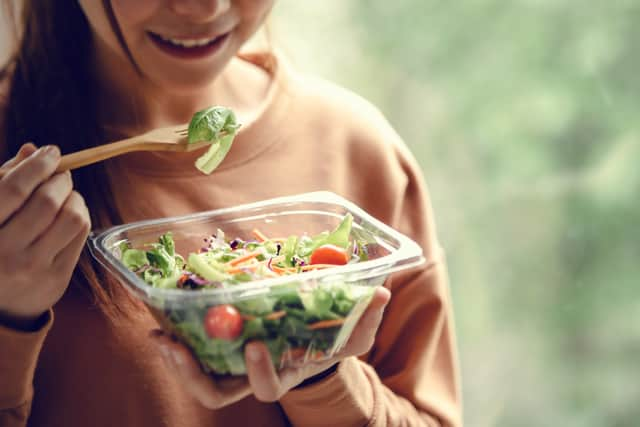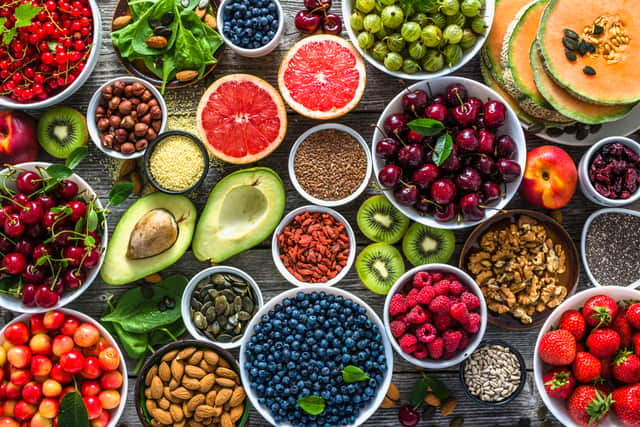How to eat healthy on a budget: 7 tips from experts on foods to eat and diet hacks amid cost of living crisis
This article contains affiliate links. We may earn a small commission on items purchased through this article, but that does not affect our editorial judgement.
and live on Freeview channel 276
A major cost of living crisis is currently sweeping across the UK, with inflation sitting at a 40-year high.
The situation looks set to get worse before it gets better, as the Bank of England has forecast that the Consumer Prices Index will hit 11% before the end of 2022.
Advertisement
Hide AdAdvertisement
Hide AdThis gloomy prediction has mostly come as a result of the Russia-Ukraine war, which is set to push up the Ofgem energy price cap by another 51% this autumn.
Rocketing food prices have also been a big driver of inflation.
Not only has the cost of the average grocery basket risen by 8.6% year-on-year (as of May 2022), but supermarket value ranges are also experiencing dramatic price hikes.


So, if your budget is struggling to keep up, how can you maintain a healthy diet without breaking the bank?
Advertisement
Hide AdAdvertisement
Hide AdNationalWorld has sought out the advice of some of the UK’s foremost food and nutrition experts.
What impact is the cost of living having on healthy diets?
Even before the cost of living crisis, the UK’s poorest people were struggling to afford healthly diets.
The Food Foundation’s 2021 Broken Plate report found the poorest fifth of UK households needed to spend 40% (up from 39% in 2020) of their disposable income on food to meet Eatwell guidelines (the NHS’s healthy-eating metric).
For the richest fifth of households, the figure was 7% - a 1% fall on 2020’s report.
Advertisement
Hide AdAdvertisement
Hide AdThe report also found healthier foods were nearly three times more expensive calorie for calorie than less healthy foods.
Meanwhile, children in the most deprived fifth of households were almost twice as likely to be obese by ages four to six than their peers in the wealthiest fifth.


With the cost of living getting even pricier, Sarah Coe - a nutrition scientist at the British Nutrition Foundation - says it’s “likely” this situation will get worse.
“Households experiencing food poverty in the UK are growing in number, meaning more people are without access to nutritious food and are instead relying on cheap, energy-dense, nutrient-poor foods,” she says.
Advertisement
Hide AdAdvertisement
Hide AdMs Coe and Professor Alex Johnstone from the Rowett Institute of Nutrition and Health at the University of Aberdeen have both given tips on how to eat healthily on a budget:
- Plan ahead by thinking about sources of nutrition
As NationalWorld revealed in a piece on how to save money on your supermarket shop, planning ahead is a great way of saving cash.
But it can also help you to find lower cost options that hit the key food groups, says Sarah Coe.


“A healthy, balanced diet would include plenty of fruit and vegetables and fibre-rich foods from a variety of sources, protein from a range of sources especially beans, peas and lentils, some dairy foods or fortified alternatives, and some ‘healthy’ unsaturated fats,” she says.
- Don’t be afraid of supermarket value ranges
Advertisement
Hide AdAdvertisement
Hide AdWhile supermarket value ranges have not been immune to price increases, they can be a great source of healthy foods, says Sarah Coe.
“Supermarket value range choices of staple foods like bread, potatoes, rice and pasta are generally good value for money,” she says.
“These, particularly higher fibre varieties like wholewheat bread, wholemeal pasta, brown rice and potatoes with skins can be useful foods to base meals on.”
- Look out for nutrition labeling to make healthy choices
Most food and drink items you find in UK supermarkets have nutrition labels on their packaging.
Advertisement
Hide AdAdvertisement
Hide AdThis labeling can sometimes take the form of a traffic light, which shows you how a food or drink item weighs in when it comes to unhealthy food groups, like saturated fat, sugar and salt.


“Green colour-coded sections on the traffic light front-of-pack labels mean it is a healthier product, in comparison to red labels,” says Professor Johnstone.
If there isn’t a traffic light label on the food’s packaging, foods like cakes, biscuits and sugar-sweetened drinks are generally high in saturated fat, salt and sugars (HFSS foods) as a rule of thumb.
“These are not needed and should be consumed less often and in smaller amounts,” says Sarah Coe.
Advertisement
Hide AdAdvertisement
Hide Ad“Eating too many energy-dense foods that are high in fat or sugar can increase the risk of obesity, which can in turn lead to further health problems like type 2 diabetes, heart disease and stroke.”
- Fruit and veg don’t have to be bought fresh to be healthy
Professor Johnstone says: “Canned and frozen vegetables may have a higher nutrition value in comparison to produce that is old and over-cooked.”
She is echoed by Sarah Coe, who adds: “Fruit and vegetables are often cheaper if you buy them canned or frozen and will still count towards your 5 a day.


“If buying canned fruit and veg these should be in natural juice or water with no added salt or sugar.
Advertisement
Hide AdAdvertisement
Hide Ad“If you want to buy fresh fruit and vegetables, look for varieties on offer in the supermarket each week.
“Some supermarkets also sell ‘wonky’ fruit and vegetables which are just as nutritious but vary in shape and size, so tend to be a bit cheaper.”
- Tinned foods can be healthy in other food groups too
It’s not just fruit and veg that can be both cheap and healthy when coming in tins, Sarah Coe says.
“Good value protein sources include canned beans, like kidney beans, chickpeas and lentils. These are also high in fibre,” she says.
Advertisement
Hide AdAdvertisement
Hide Ad“Frozen fish and canned oily fish such as sardines and salmon can be cheaper than buying fresh fish. Oily fish are high in omega-3 fats which can help to keep the heart healthy, plus frozen and canned varieties can be easy to prepare and have a long shelf-life.
Coe says that if you’re buying frozen, go for items without “added ingredients like breadcrumbs or batter”.
- Cook from scratch
According to Professor Johnstone, scratch cooking is a cheaper way of getting your nutrition.
“It would be cheaper to buy ingredients - like veg and cheaper cuts of meat - to make a meal from scratch rather than buy it prepared,” she says.
Advertisement
Hide AdAdvertisement
Hide Ad“This requires some planning to buy the correct ingredients and the ability to budget for gas and/or electricity.”
- Shop local - or find a large supermarket
The British Dietetic Association makes several recommendations for healthy eating on a budget on its website.
One measure it recommends is heading to your local food market.
As well as being locally-sourced, market produce usually offers good value for money.
But if you can’t make it along to one, larger supermarkets often have a wider range of produce that’s cheaper.
Comment Guidelines
National World encourages reader discussion on our stories. User feedback, insights and back-and-forth exchanges add a rich layer of context to reporting. Please review our Community Guidelines before commenting.
